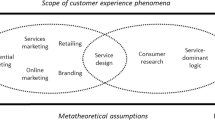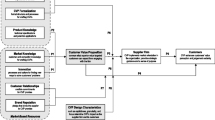Abstract
Consumer research has shown that satisfaction with complaint handling strongly favours word-of-mouth but affects repurchasing to a lesser extent. To better understand post-complaint consumer response, we propose and test a model in which both gratitude and transactional satisfaction are assumed to be critical mediators of the effects of recovery investments on performance outcomes. Our results show a contrasting pattern of results for each mediator. Whereas gratitude strongly influences repurchase intent but does not explain word-of-mouth intent, transactional satisfaction, with its effect on repurchase intent being fully mediated by the latter construct, strongly contributes to word-of-mouth intent. Drawing on the analysis of pre-existing brand attitude as a moderator, our findings also suggests that the mediating roles of gratitude and satisfaction rely on different psychological mechanisms. The implications of these findings are significant for service recovery researchers and managers.

Similar content being viewed by others
References
Aaker, J., Fournier, S., & Brasel, A. (2004). When good brands do bad. Journal of Consumer Research, 31, 1–16.
Bartlett, M., & DeSteno, D. (2006). Gratitude and prosocial behavior: helping when it costs you. Psychological Science, 17, 319–325.
Chea, S., & Luo, M. (2008). Post-adoption behaviors of E-service customers: the interplay of cognition and emotion. International Journal of Electronic Commerce, 12(3), 29–56.
Cohen, J., Cohen, P., West, S., & Aiken, L. S. (2003). Applied multiple regression/correlation analysis for the behavioral sciences (3rd ed.). NJ: Erlbaum.
Dahl, D. W., Honea, H., & Manchanda, R. (2005). Three Rs of interpersonal consumer guilt: relationship, reciprocity, reparation. Journal of Consumer Psychology, 15(4), 307–315.
Davidow, M. (2003). Organizational responses to customer complaints: what works and what doesn’t. Journal of Service Research, 5, 225–250.
DeWulf, K., Odekerken-Schröder, G., & Iacobucci, D. (2001). Investments in consumer relationships: a cross- country and cross-industry exploration. Journal of Marketing, 65, 33–50.
Emmons, R. (2004). The psychology of gratitude: an introduction, the psychology of gratitude (pp. 3–16). New York: Oxford University Press.
Fredrickson, B. (2004). Gratitude, like other positive emotions, broadens and builds. The psychology of gratitude (pp. 145–166). New York: Oxford University Press.
Friestad, M., & Wright, P. (1994). The persuasion knowledge model: how people cope with persuasion attempts. Journal of Consumer Research, 21, 1–31.
Gelbrich, K., & Roschk, H. (2011). A meta-analysis of organizational complaint handling and customer responses. Journal of Service Research, 14(1), 24–43.
Goei, R., & Boster, F. (2005). The roles of obligation and gratitude in explaining the effect of favors on compliance. Communication Monographs, 72, 284–300.
Hess, R., Ganesan, S., & Klein, N. (2003). Service failure and recovery: the impact of relationship factors on customer satisfaction. Journal of the Academy of Marketing Science, 31, 127–145.
Maxham, J., III, & Netemeyer, R. (2002). Modelling customers perceptions of complaint handling over time: the effects of perceived justice on satisfaction and intent. Journal of Retailing, 78(4), 239–252.
McCollough, M., Berry, L., & Yadav, M. (2000). An empirical investigation of customer satisfaction after service failure and recovery. Journal of Service Research, 3, 121–137.
McCullough, M., Emmons, R., Kilpatrick, S., & Larson, D. (2001). Is gratitude a moral affect? Psychological Bulletin, 127, 249–266.
Morales, A. (2005). Giving firms an ‘e’ for effort: consumer responses to high-effort firms. Journal of Consumer Research, 31, 806–812.
Orsingher, C., Valentini, S., & de Angelis, M. (2010). A meta-analysis of SATCOM in services. Journal of the Academy of Marketing Science, 38(2), 169–186.
Palmatier, R., Jarvis, C., Bechkoff, J., & Kardes, F. (2009). The role of customer gratitude in relationship marketing. Journal of Marketing, 73(5), p1–p18.
Petty, R., Wegener, D., & Fabrigar, L. (1997). Attitudes and attitude change. Annual Review of Psychology, 48, 609–647.
Podsakoff, P., MacKenzie, S., Lee, J.-Y., & Podsakoff, N. (2003). Common method biases in behavioral research: a critical review of the literature and recommended remedies. Journal of Applied Psychology, 88(5), 879–903.
Rindfleisch, A., Malter, A. J., Ganesan, S., & Moorman, C. (2008). Cross-sectional versus longitudinal survey research: concepts, findings, and guidelines. Journal of Marketing Research, 45, 261–279.
Roehm, M., & Brady, M. (2007). Consumer responses to performance failures by high-equity brands. Journal of Consumer Research, 34, 537–545.
Soscia, I. (2007). Gratitude, delight, or guilt: the role of consumers’ emotions in predicting postconsumption behaviors. Psychology and Marketing, 24, 871–894.
Szymanski, D. M., & Henard, D. H. (2001). Customer satisfaction: A meta-analysis of the empirical evidence. Journal of the Academy Marketing Science, 29(1), 16–35.
Tax, S. S., Brown, S. W., & Chandrashekaran, M. (1998). Customer evaluations of service complaint experiences: implications for relationship marketing. Journal of Marketing, 62, 60–76.
Thomson, M., MacInnis, D. J., & Park, C. W. (2005). The ties that bind: measuring the strength of consumers’ attachments to brands. Journal of Consumer Psychology, 15(1), 77–91.
Watkins, P. C., Scheer, J., Ovnicek, M., & Kolts, R. (2006). The debt of gratitude: dissociating gratitude and indebtedness. Cognition and Emotion, 20, 217–241.
Author information
Authors and Affiliations
Corresponding author
Rights and permissions
About this article
Cite this article
Simon, F., Tossan, V. & Guesquière, C.C. The relative impact of gratitude and transactional satisfaction on post-complaint consumer response. Mark Lett 26, 153–164 (2015). https://doi.org/10.1007/s11002-013-9271-0
Published:
Issue Date:
DOI: https://doi.org/10.1007/s11002-013-9271-0




